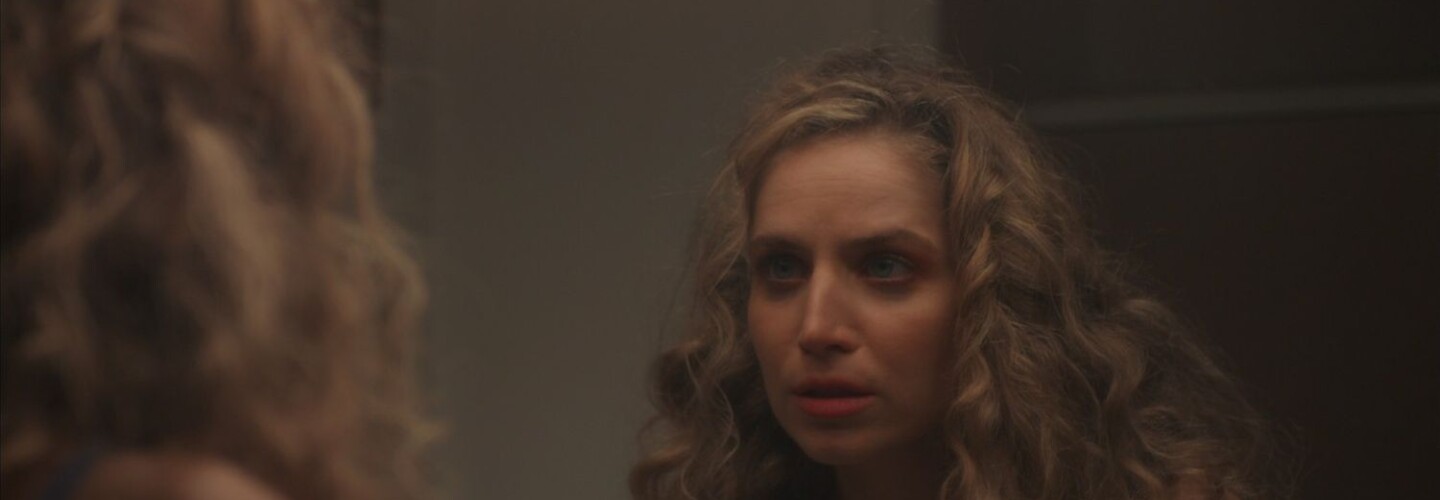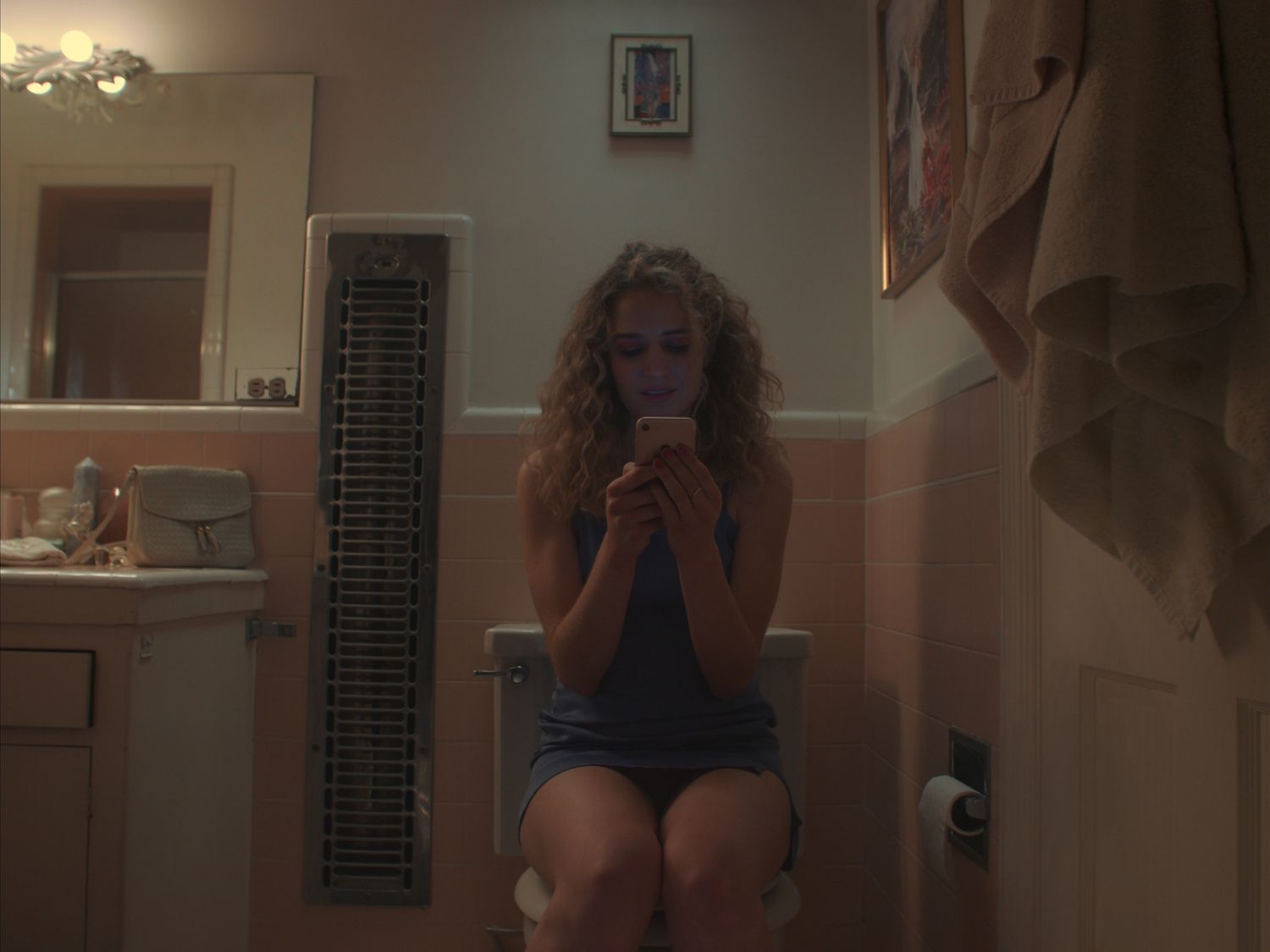
The majority of us have found ourselves at one time or another in the unenviable position of wanting to hide from people at some sort of social gathering, be that as the result of some inadvertent faux pas or simply to relish in a moment of solitude. But what happens if that moment is continually interrupted by the very situations we were fleetingly trying to avoid and a procession of people you were girding your loins against? Boldly based on her own self confessed “complicated past” Writer/Director Aiden Arata’s short film Powder Room is a somewhat self-deprecating yet powerful portrayal of the trials and tribulations we face when navigating friendships, lovers and the awkward social interactions in our lives. A film where awkward, inescapable conversations take centre stage and the first Directors Notes premiere of 2022, we talk to Arata about switching aspect ratios in order to not feel the confines of shooting predominantly in one retro garish space, empowering talented cast and crew to do their jobs and how sometimes in life opportunities and creativity converge perfectly so that you have no choice but to run with the opportunity.
How did you come to make Powder Room and work partner with Producer Cecily Elliott on its creation?
Powder Room came about as a mix of personal experience and a unique production opportunity. Cecily was integral to developing the concept for the film – we met on the bus the first day of seventh grade, and we’ve been friends and collaborators ever since. We were living together in Highland Park, loosely thinking about making something together, when I learned my late grandma’s house was going to be gutted for renovation. It was one of those sprawling 70s mansions with shag carpeting and quaaludes wallpaper, and Cec and I both spent a lot of time there; we decided to shoot in the empty home, making use of a free set and allowing me to preserve some fond memories. We wanted a very contained story (as a narrative exercise and to stretch our micro-budget) and I have a long history of spending parties in the bathroom so we sort of took it from there. I had a pretty fraught early 20s, and thanks to a ton of therapy I’ve developed both stability and a sense of humor about the messy, unhinged process of becoming a good person.
I think Cecily found most of our main players, we’re really lucky and ended up with a crew of incredibly talented artists and friends. Carter Ross, our DP, was fantastic, he’s a genius technically and he totally understood the vibe right away. We switch aspect ratios in the film and do some weird subtle stuff like that, which was really fun, and he was super creative and game.
The bathroom was the last room to be torn down, the entire rest of the house was fully under construction during shooting which was a little hectic, but we were able to shoot the film over 2 days with a small, mostly-female crew. Most of the costumes and set dec came from my house (I still have all the paintings hung up in my apartment). Everyone was incredibly professional and talented but there was also a great sense of play. We also got super lucky because we shot the film in February of 2020 – one month later and it couldn’t have happened!
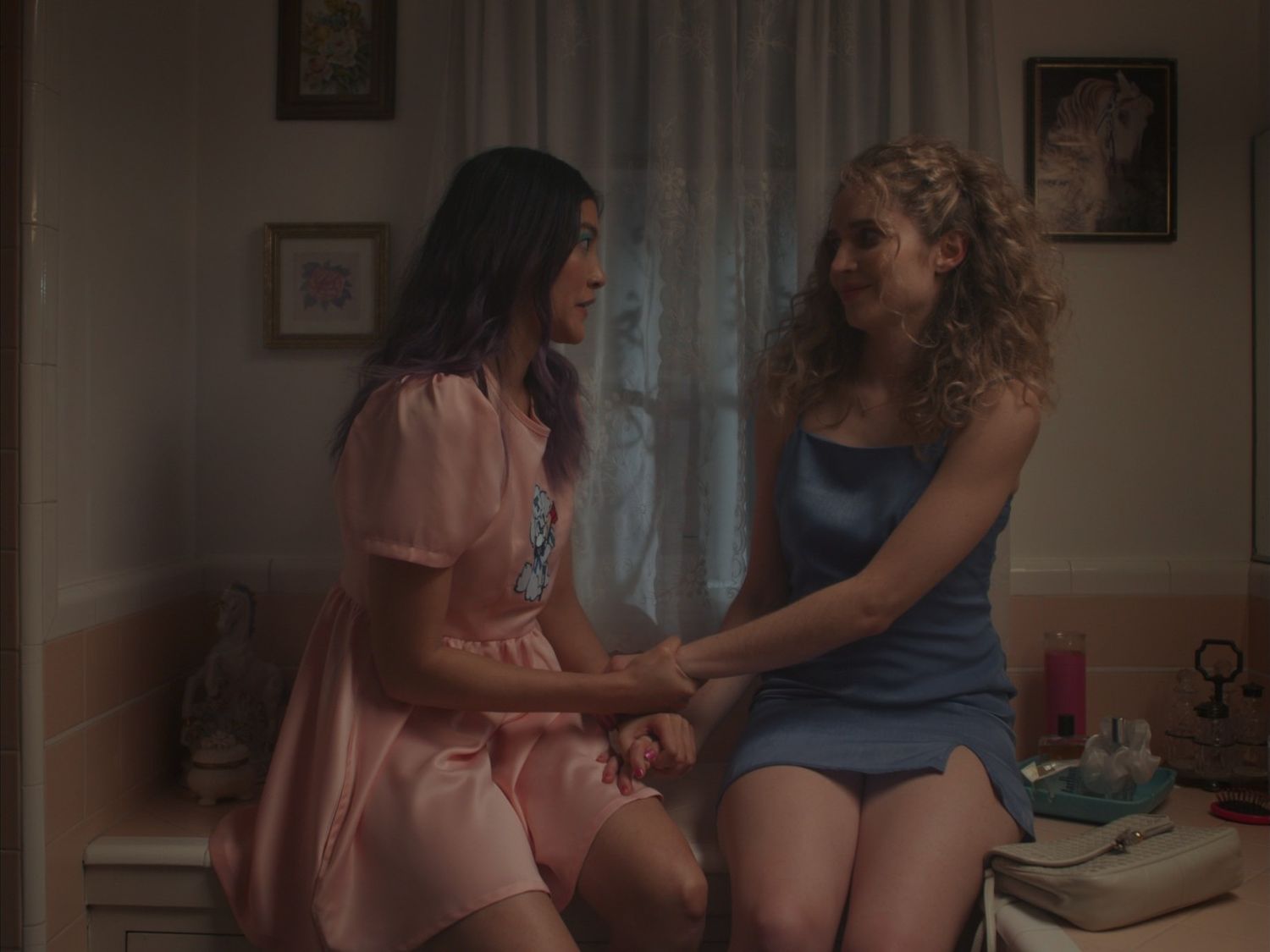
As Powder Room comes from personal experiences, what do you think are the benefits and or pitfalls of creating something so close to you?
One of the benefits of writing from personal experience, of course, is that it’s easy to get into your protagonist’s head; all the small choices that make a character feel like a person come naturally since you’re using yourself as a template. I also think it can be really therapeutic to rework your life – like, that memory isn’t a shame spiral or an intrusive thought, it’s an alternatively significant moment. It’s relatable, it’s not bigger than me. There’s a certain mastery you feel over your past when you can achieve that, I think.
To have someone assume things about you because of a character you wrote can feel a little frustrating, though mostly I find it flattering.
Of course, there are also some pitfalls. Firstly, audiences tend to assume that if a character is partially rooted in a real experience, then the entire story is real life. That’s not true at all. To have someone assume things about you because of a character you wrote can feel a little frustrating, though mostly I find it flattering – if the writing is that realistic, great. You also have to take extra care to make the other characters as real as your protagonist, to let them stand on their own and push back on ‘your’ perspective.
It’s actually a really interesting experience to see how other people experience your version of yourself. I’ve realized that I tend to be really self-deprecating, really hard on myself under the guise of fictionalization. I remember being in a memoir class in college, working on a slightly fictionalized personal story, and in the workshop my classmates told me that the protagonist had no redeeming qualities. None. I wrote myself as totally unlikeable! So that’s been a fun therapy thing. I think Emma needed redemption, or the potential for redemption because it makes her character and the story way more interesting if she’s actually fighting for something; but also maybe I needed her to have a bit of a win because I just don’t hate myself the way I used to.
The dialogue is witty and very relatable yet not trite – you spoke about the writing being a narrative exercise, can you please elaborate on your process and how you managed to it to where you wanted?
Thank you! I think there’s something play-like about Powder Room, in that it’s basically a bunch of people talking in a room. Because of how small the world is, we don’t really get to “show and not tell,” so there’s a lot of exposition that needs to be handled very delicately. The list of amends was a fun way to talk about Emma’s past, and of course, Pete’s mortifying monologue. The entire cast was so great – the actors all knew each other before the shoot, and they really naturally slid into those intimate relationship dynamics. I talk out loud a lot when I’m writing, which I think helps dialogue sound natural. We also did a ton of table reads where the floor was open for anyone to say, “I don’t think people talk like this”.
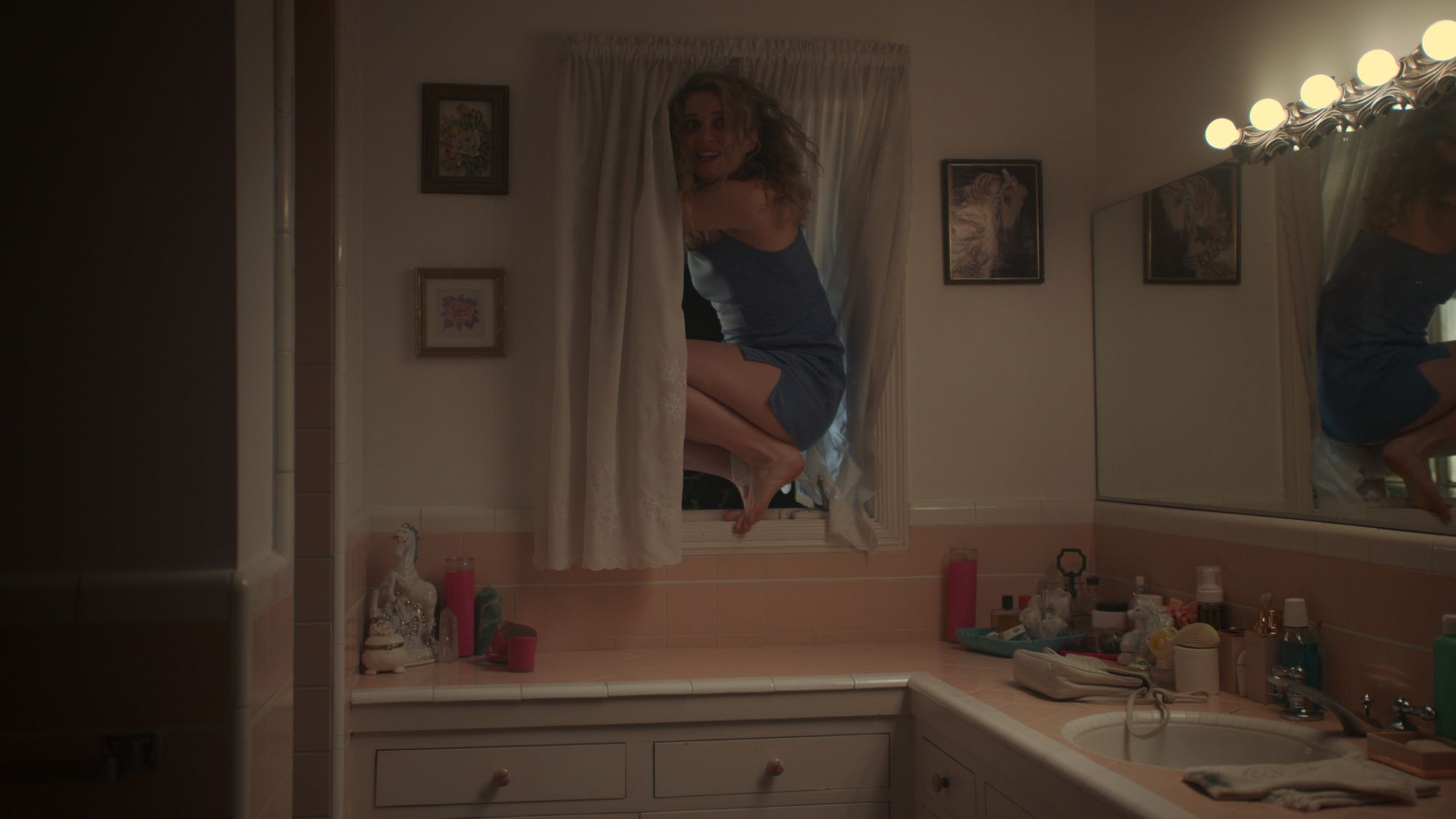
How did you manage to create a full world for your audience from within the confines of that one bathroom?
The film is about a lot of messiness crammed into one bathroom trip, so in some ways, shooting in one tiny room felt natural. Aesthetically, I was lucky in that the bathroom already felt so atmospheric with all that prim claustrophobic pink. I went thrifting or used stuff from my apartment (I have a robust ceramic unicorn collection) to make the whole vibe very pretty but a little oppressive, a little off. Mirror shots helped develop depth, and the intimacy of the story worked really well with close-ups. There was a lot of hiding in the bathtub!
Switching aspect ratios was another way to play with the scope of the world.
It also felt important that the characters were sort of constantly interrupting each other coming in and out of the bathroom, a reminder that things were happening outside. Switching aspect ratios was another way to play with the scope of the world – the bathroom scenes are all shot in 4:3, while the cutaways – the mountain and the “Pepsi building” – and the outside scene are shot in 16:9. Emma has these intrusive escapist fantasies, but when she finally breaks out of the confines of her old identity, she’s lying in the dirt. She’s humbled, but she’s free.
Your first film Creep was well received, how did that experience inform the making of this?
Cecily and I were living together at the time. We’d had a great time making our first short, but the whole process had been hectic; we were very much on our own for that film, and we’d learned everything as we went. We had a better sense of how much effort and money it took to make a 10-minute film, so we aimed for a contained story. It was total chance that my late grandma’s house would be free to shoot in for a short period of time as it was being renovated, and that the bathroom was the last room to be demolished. I’m so grateful to Cecily, and to my parents who let us shoot there, and to whatever mystical powers created this confluence of events so that I was forced to put aside my imposter syndrome and creation anxiety and just make something in this tiny window of opportunity.
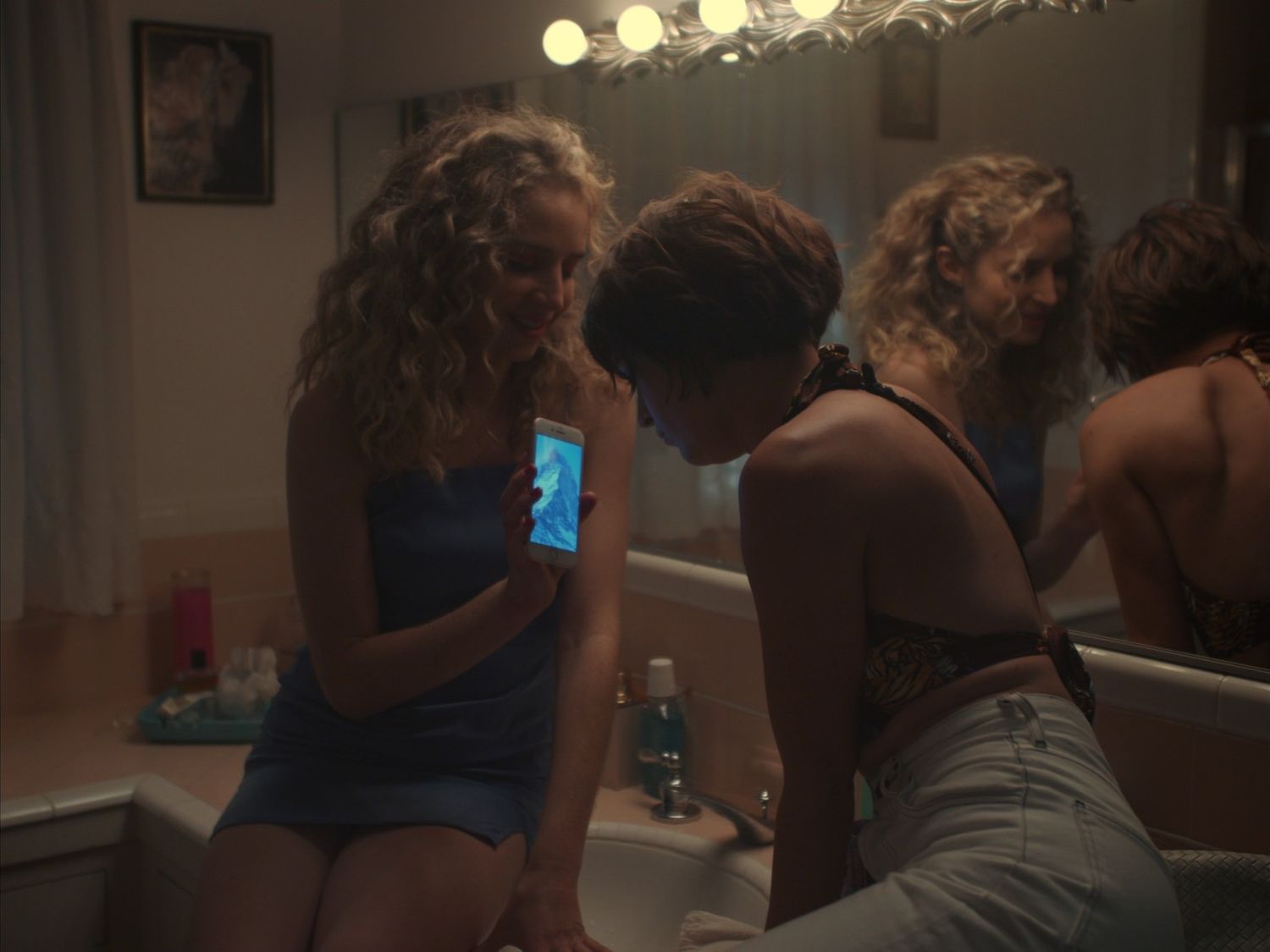
What was the editing process like?
Our Editor Kelly Walker was so great – she writes and directs as well, and she was really excited about this script, so she came into the editing process with a very intuitive understanding of how the story should come together. We edited in quarantine, on Zoom. It was difficult at times to sync everything, just basic technical issues, but I feel like we had great communication.
I was forced to put aside my imposter syndrome and creation anxiety and just make something in this tiny window of opportunity.
Maybe this is a bit of an aside, but honestly, I think that a lot of directing is finding excellent people and letting them do their job. Your job as a director is to understand the vision of the film and to translate that as clearly as possible into the language of sound and set design and color correction, etc, so everyone’s on the same page. I don’t know that I fully buy into the whole director-as-god thing; everything is in service to the project, not to you. There were some unique challenges, like shots that could feel repetitive because we’re in such a small space, and working in the cutaways, but I think things came together really well as a result of collaboration.
What are you going to bring us next time?
Great question! I’ve been making a lot of online content, which is a very different voice – the pacing is faster, it’s less narrative. You can take a lot of risks because the stakes are way lower: You aren’t spending thousands of dollars, and if your product is mediocre, you can post something else tomorrow. I’d love to bring that online sensibility to longer projects, to really develop the worlds I’ve built online. I have a few projects in 2022 that I’m very hopeful/excited about. I’m being coy, but if everything goes well, a few really cool things are coming soon 🙂

